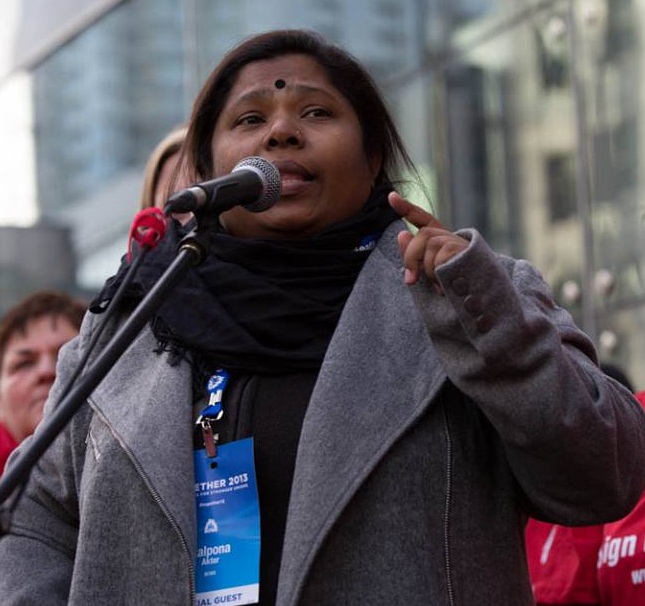WELCOME TO THE ARCHIVE (1994-2014) OF THE MAQUILA SOLIDARITY NETWORK. For current information on our ongoing work on the living wage, women's labour rights, freedom of association, corporate accountability and Bangladesh fire and safety, please visit our new website, launched in October, 2015: www.maquilasolidarity.org
June 3, 2014
Photo (above) by IndustriALL): Bangladeshi garment workers form human chain demanding compensation for Rana Plaza survivors
Photo (below) by BC Federation of Labour: Kalpona Akter of the Bangladesh Centre for Worker Solidarity (BCWS) speaks at Vancouver rally
More than a year after one of the worst industrial disasters in modern history, most of the international brands using factories in the Rana Plaza building prior to its collapse have failed to provide the full compensation they owe the survivors.
As of May 15, the Rana Plaza Donors Trust Fund, which was established to provide long-term compensation to the families of over 1,100 workers killed and approximately 2,500 seriously injured, had raised less than half of the $40 million needed to cover their lost income and medical expenses.
Meanwhile, reports from Human Rights Watch and Action Aid reveal that the Rana Plaza survivors are continuing to suffer the consequences of the disaster as a result of the long wait for compensation.
Survivors and relatives interviewed by Human Rights Watch said “they continue to suffer from life-changing injuries, psychological trauma, and a loss of income… some are struggling to feed their families and send their children to school.”
According to the International Labour Organization (ILO), which oversees the Trust Fund, only US$17 million has been raised to date. Of that, UK brand Primark has contributed a total of $8 million, while Canada’s Loblaw (owner of Joe Fresh) has contributed close to $3.4 million.
All other corporate contributions to the Fund are $1 million or less: Walmart $1 million, The Children’s Place $450,000, German retailers KiK $500,000 and Guldenpfenning GmbH $500,000, and the Dutch C&A Foundation $690,000.
The remaining companies listed as donors have so far declined to reveal the amounts of their contributions.
Even more disturbing than the small amounts of most of these contributions is the fact that 15 of the 29 brands that have been linked to factories in the Rana Plaza building, including major European retail companies like Benetton and Auchan, have contributed nothing to the fund to date.
“Brands are failing workers a second time,” says Ineke Zeldenrust of the Clean Clothes Campaign, “first they failed to ensure the factories they bought from were safe, and now they are failing the survivors and the families of those who lost loved ones by not contributing significantly to the Donor Trust Fund.”
Time to Pay Up
 In response to these miserly contributions by major international brands and retailers, an international coalition of trade union and labour rights organizations – Global Unions UNI and IndustriALL, Clean Clothes Campaign, International Labor Rights Forum, Worker Rights Consortium, and MSN -- have launched the Pay Up Campaign to pressure companies to make substantial contributions to the Trust Fund. On the April 24 one-year anniversary of the Rana Plaza tragedy, as unions and Rana Plaza survivors took part in protests and memorial events, the Pay Up campaign staged store actions in cities across Europe and North America targeting The Children’s Place, Walmart and Benetton.
In response to these miserly contributions by major international brands and retailers, an international coalition of trade union and labour rights organizations – Global Unions UNI and IndustriALL, Clean Clothes Campaign, International Labor Rights Forum, Worker Rights Consortium, and MSN -- have launched the Pay Up Campaign to pressure companies to make substantial contributions to the Trust Fund. On the April 24 one-year anniversary of the Rana Plaza tragedy, as unions and Rana Plaza survivors took part in protests and memorial events, the Pay Up campaign staged store actions in cities across Europe and North America targeting The Children’s Place, Walmart and Benetton.
In Canada, labour, women’s, community and international development organizations organized demonstrations at Children’s Place stores in Vancouver and Toronto and at Walmart stores in Sudbury and Montreal.
MSN continues to lobby Canadian and US companies sourcing apparel products from Bangladesh to make substantial contributions to the Rana Plaza Donors Trust Fund.
Accord moves forward on factory inspections
As companies lag behind on payment of just compensation to the Rana Plaza survivors, the Accord on Fire and Building Safety in Bangladesh is moving forward on safety inspections in the approximately 1,600 garment factories covered by the Accord.
As of May 10, 1,400 structural, fire and electrical inspections had been carried out in more than 450 factories. So far, ten factories have had to be temporarily closed because of structural flaws in the buildings.
Under the Accord, workers are entitled to receive their regular pay during temporary closures, and the signatory brands must ensure that the cost of necessary factory upgrades is covered.
Over 160 major retailers and brands based in Europe, North America, Australia and Asia have signed the legally-binding Accord, which provides for independent factory safety inspections, public reports on the findings and corrective action taken, health and safety training for workers and management personnel, and an active role for workers in hazard detection through health and safety committees.
To date, only one Canadian company – Loblaw – has signed the Accord.
On April 24, World Vision Canada announced a campaign calling on major Canadian retailers to sign the Accord. World Vision also released the findings of an Ipsos Reid poll showing that 8 of 10 Canadians would feel more willing to buy products from retailers who have signed the Accord.
The poll also found that 88 percent of Canadians believe the Accord should be the standard for the textile industry and safety standards, and 85 percent believe that all major Canadian retailers should sign the Accord.